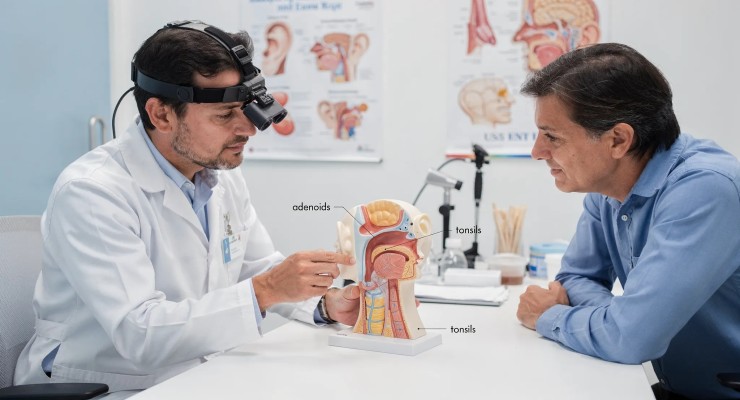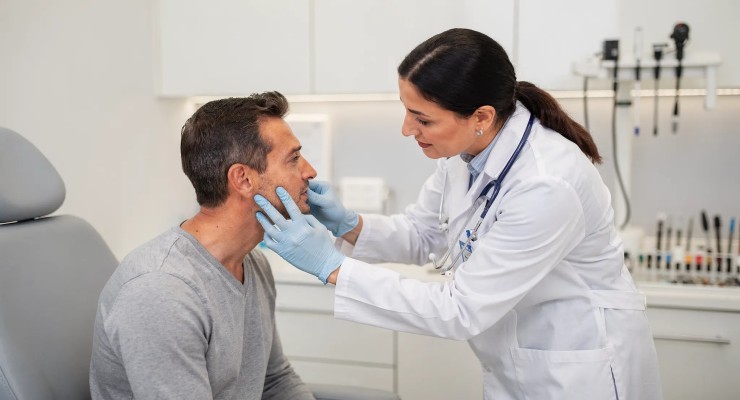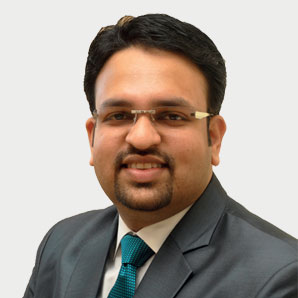Blogs
Why Antibiotics Aren’t Always the Right Choice for Sinus Infections

Sinus infections are more common than you think-but the solution isn’t always popping an antibiotic. Many people mistakenly assume that antibiotics are a quick fix for sinus discomfort, but in reality, this approach could do more harm than good. At Ascent ENT Hospital, recognized as the best ENT hospital in Kerala, we believe in personalized, accurate diagnosis and evidence-based care.
Let’s break down why antibiotics may not always be the answer and what you can do instead.
Understanding Sinus Infections: Types and Triggers
Your sinuses are four pairs of hollow air-filled spaces (frontal, maxillary, ethmoid, and sphenoid) that surround your nasal cavity. They connect to your nose through small openings called ostia. When the lining of these sinuses becomes inflamed, it leads to sinusitis.
There are two major types of sinusitis:
-
Acute sinusitis: Usually lasts less than 10 days.
-
Chronic sinusitis: Lasts more than 12 weeks and often requires deeper investigation.
The most common cause? Viral infections, which account for about 95% of all sinusitis cases and are self-limiting. Other triggers include:
-
Allergies
-
Nasal polyps
-
Deviated septum
-
Bacterial or fungal infections
-
Dental infections or tumors
An ENT specialist diagnoses sinusitis through clinical evaluation, nasal endoscopy, and sometimes imaging like CT scans. If you’re dealing with persistent symptoms, don’t guess-visit the best ENT clinic in Kerala for expert assessment.
The Role of Antibiotics in Sinus Treatment: When They Help and When They Don’t
Here’s where most people get it wrong: not all sinus infections require antibiotics.
Antibiotics are effective only when a sinus infection is caused by bacteria. Even then, they’re reserved for cases where:
-
Symptoms persist beyond 10 days
-
High fever occurs
-
Facial swelling, redness, or severe eye irritation is present
-
The patient is immunocompromised (e.g., diabetic)
Most sinus infections, however, are viral. Taking antibiotics in such cases won’t help and may even delay recovery by disrupting your natural immune response.
Ascent ENT advises patients to avoid self-medicating with antibiotics and seek proper ENT evaluation to confirm the nature of their condition.
Risks of Overusing Antibiotics for Sinus Infections
Let’s talk about the real danger: antibiotic overuse.
-
Antibiotic resistance: When antibiotics are used too often or incorrectly, bacteria evolve to resist them. This creates superbugs that are harder to treat, putting global health at risk.
-
Side effects: Nausea, diarrhea, and allergic reactions are just the tip of the iceberg. Overuse can also disrupt gut health and immune function.
-
Symptom masking: Using antibiotics without a bacterial infection won’t treat the actual issue-like nasal polyps or fungal sinusitis. Instead of solving the root cause, you're just covering it up.
That’s why the expert team at our sinus diseases hospital in Calicut emphasizes proper diagnostics over shortcuts.
Evidence-Based Alternatives to Antibiotics
There’s good news: sinus infections can often be managed effectively without antibiotics. At Ascent ENT, we follow a multi-step, evidence-based approach.
Here’s what works:
-
Saline nasal irrigation (douching): Helps clear out mucus and allergens.
-
Steam inhalation and hot fomentation: Soothes irritated nasal passages.
-
Topical or oral nasal decongestants: Relieve pressure and inflammation.
-
Nasal corticosteroids: Reduce swelling in the nasal lining.
-
Lifestyle changes: Staying hydrated, using a humidifier, avoiding allergens.
Still not improving? That’s when advanced ENT treatments come into play:
-
Functional Endoscopic Sinus Surgery (FESS)
-
Balloon sinuplasty
-
Septoplasty (for a deviated septum)
-
Polyp removal
-
Fungal debris or tumor removal
These treatments are available at our sinus disease hospital in Perinthalmanna, where we offer specialized care tailored to complex sinus conditions.
When to See a Specialist for Sinus Infections
You shouldn’t wait too long if:
-
Your sinus symptoms last more than 10 days
-
You experience recurrent episodes within a year
-
Home remedies don’t work
-
You have facial pain, pressure, or nasal obstruction that worsens
ENT specialists at Ascent ENT Hospital use cutting-edge tools like nasal endoscopy and imaging to uncover the real cause. Our goal is to provide tailored sinus treatment beyond antibiotics, especially for chronic or complex cases.
For expert care, visit a trusted sinus diseases hospital in Kerala offering complete sinus diseases treatment in Kerala with advanced diagnostics and ENT solutions.
Conclusion: Choose the Right Treatment, Not Just the Easy One
We get it-antibiotics seem like a quick fix. But when it comes to sinus infections, that "quick fix" could end up causing long-term damage. It’s not about doing what’s easy; it’s about doing what’s right for your health.
The team at Ascent ENT Hospital-one of the best ENT hospitals in Kerala--is here to help you find lasting relief with accurate diagnoses and personalized treatment plans. Don’t self-medicate. Book a consultation today and breathe easier tomorrow
Share
Share on WhatsAppOur Professionals
Our Patient Stories
View All Testimonials









.jpeg)





































